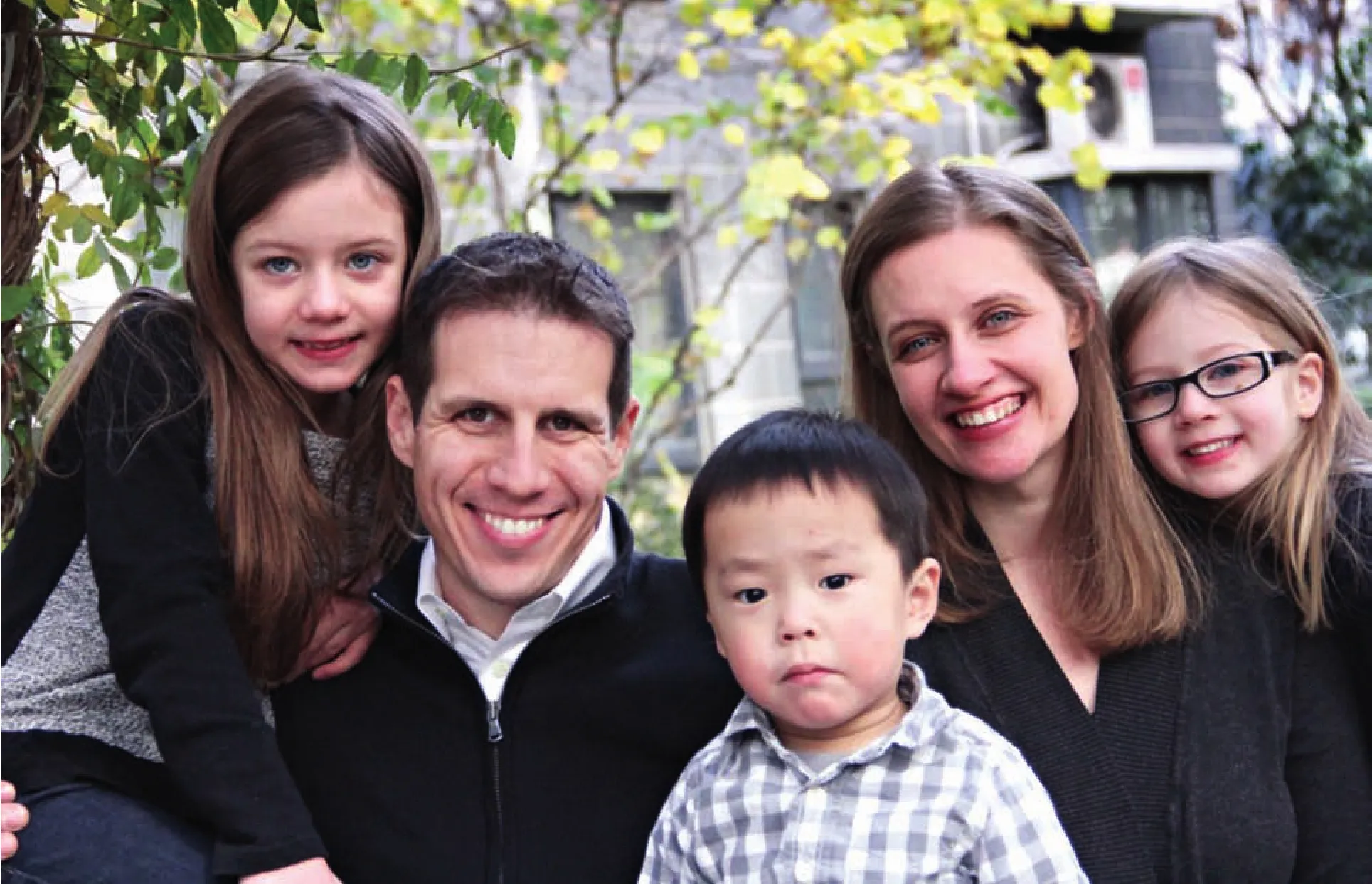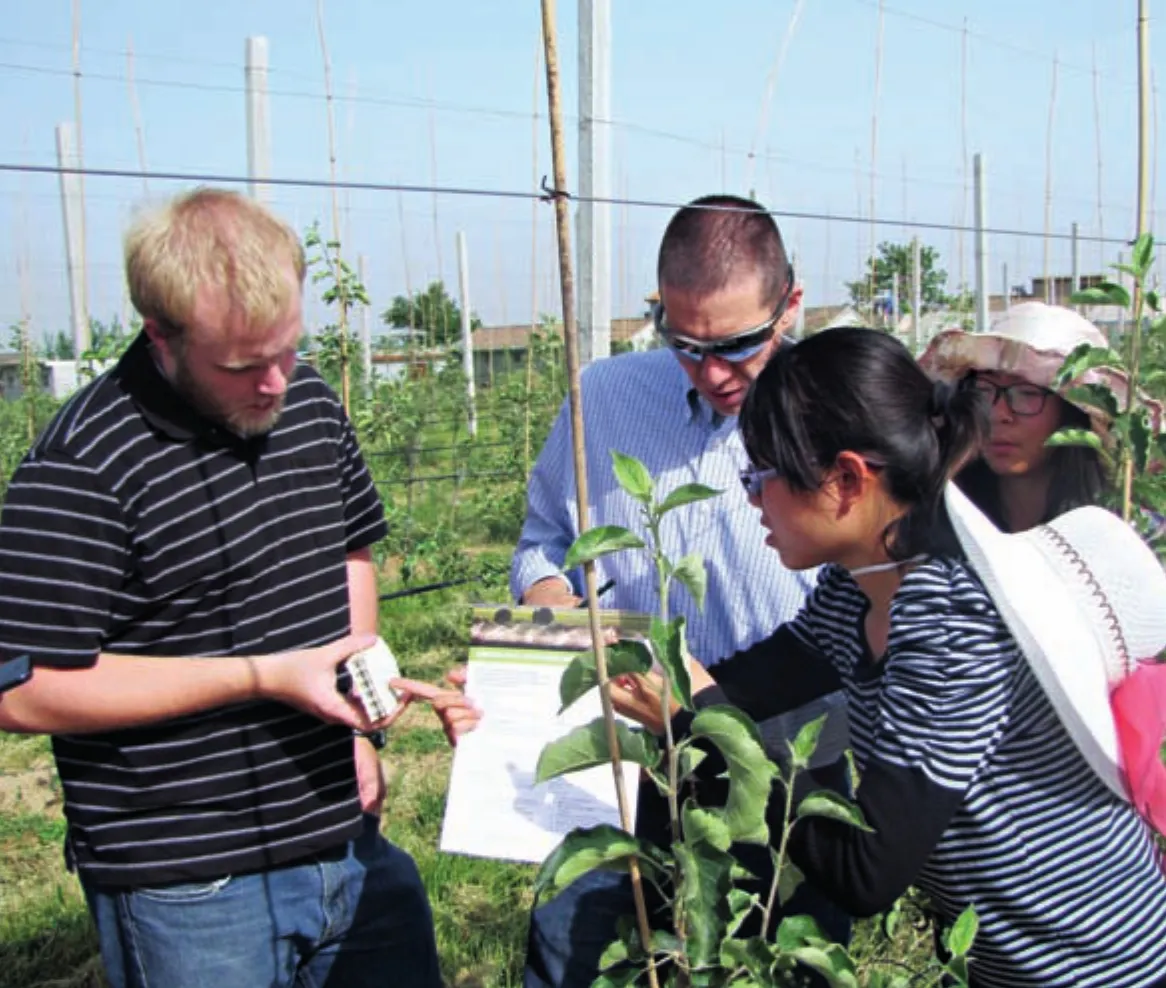中国的农业发展为我打开创业之门
文/林东(Jeremy Landon Darilek,美)
“我的研究所坐落在一个美丽的校园里,校园旁有座山,山脚下有个湖,欢迎各位随时来访!”中国访问学者海蒂(王杰)用一口出乎我意料之外的流利英文以及一种典型的中国逻辑向我描述了她那美丽的家乡,那里有山有水。记得那是在得克萨斯州的一所大学里,我们在同一个办公室,另外还有两位美国同学和一位印度同学,她公开邀请我们访问中国科学院南京土壤科学研究所。在此之前,我从未考虑过要去中国,也没有想过有一天会住在那里,更没有想过自己会在这个“中心王国”安家立业。然而,仅仅数月后,就在同一个办公室,我和妻子丽莎站在海蒂的后面,看着她用一种既陌生又神秘的文字帮我们填写网上申请表。
我曾在霍华德潘因大学和塔尔顿州立大学攻读学士及硕士学位,而我对中国的第一印象,也来自我在这两所大学里所认识的几位中国同学。他们勤奋、积极,对美国文化充满着好奇。我向他们介绍了美国生活的方方面面,大家在一起相处得十分融洽。
在塔尔顿州立大学,我的教授与中国科学院的教授有一个合作研究的课题,而这些同学和其他到访的中国学者也都为此而来。当自己被邀去中国进行学习研究并在南京土壤研究所攻读博士学位时,我和妻子都非常激动,但未来具体会是什么样的,我们无从知晓。

林东(Landon Darilek),美国农业专家,目前和家人定居于西安。2003年于美国得克萨斯州的霍华德潘因大学取得学士学位。2006年于美国的得克萨斯州的塔尔顿州立大学取得硕士学位,2009年中国科学院南京土壤研究所博士毕业。2010—2012年在陕西师范大学任教。2012年7月他注册了西安百倍农业技术咨询有限公司,开始了在中国的农业创业之旅。七年来,他的团队为十几家农业公司提供技术咨询服务,并为几十个基地提供测土配方施肥服务,致力于帮助果园减少投资成本,提高果园品质与产量。[图为作者(左二)全家福]
从在南京读博到决定留下来
2006年,我来到中国,当时的中国正在有条不紊地推进经济转型。南京是一座繁荣发展的城市,也是了解中国语言和文化的好地方。研究所的教授和同学与我们的关系都非常好,导师黄标教授甚至还邀请了我和丽莎去他家一起过年、吃饺子。10年后,我依然和许多同学都保持着联系。
初到中国时,我只会说 “你好”。回首过去的十二年,我的中文水平有了很大的提高,然而,还有一件事比我的中文进步得更快,那就是中国的发展。不久我就意识到,我竟然有机会在中国社会蓬勃发展的时刻来到这里,这实在是一件幸事。从中国古代农业时期到1949年新中国的成立,再到当代农业的发展,我的博士研究让我对中国农业的发展形成了一个独特的观点,对当前的农业政策和规划有了一个清晰的认识,更有机会从多位顶尖科学人士那里了解到中国的未来几十年将如何推进。在城市化进程方面,我对中国也有了一定的理解,城市化的快速发展给国家粮食安全、环境保护、土地利用、技术革新以及农业机械化的巨大需求等方面带来了种种挑战。然而,中国在追求进步方面永不自满,在才智发展方面勇于创新,在努力奋斗方面积极乐观、不屈不挠,这些都成为克服困难与挑战的重要筹码。

作者给客户培训灌溉系统管理
当我的同学谈到未来时,他们知道国家和个人都面临着重大的挑战,然而他们深信自己的目标一定能够实现,中国也一定会在世界面临的最紧迫的问题方面出谋划策,发挥主导作用。作为中国学术界的一名参与者,我现在开始同意他们的观点。我去过中国很多的地方,目睹了这个文明古国的工程壮举,从世界著名的万里长城,到吐鲁番古老的地下灌溉系统——坎儿井工程,再到宏伟壮丽的三峡大坝,都赋予这些远大的志向以支持和激励。
当我看到中国成功举办2008年奥运会后,那种壮观与优雅更加坚定了我的信念。我和我的妻子希望在我们年轻的岁月里能够住在中国,参与中国的建设,并且希望能够为中国的成长与发展贡献微薄之力,同时,中国在我们的个人发展与成长经历中也扮演着十分重要的角色。
在西安办自己的公司
在决定留在中国后,我们开始寻求毕业之后的下一个路口。去哪里?做什么?我们当时有各种各样的决定。就我而言,作为一个土壤学家,最有意思的工作莫过于回归初心——和土壤打交道。起初开始学习农业的时候,我了解到人类要想健康,就必须有健康的植物和动物,而植物和动物要想健康,就必须有健康的土壤。这就是我当初决定研究土壤化学与土壤肥力的原因。同样,虽然我在学术界有着一定的经验并且喜欢研究,但我还是想从最基层做起,为社会提供帮助,这意味着直接和农民接触。
就像我以前从来没有考虑过要去中国一样,我也真的从来没有想过要创业。尽管我的父亲后来成了一名企业家,但在我年少成长的过程中,我的父母当时都不是商人,所以我对经商并不熟悉。此外,我当时对中国知之甚少,只知道中国市场环境复杂,竞争激烈。但在中国生活多年后,看到了别的外国创业者的成功案例,我自己也有了一个信念,那就是直接为人们提供有价值的农业技术,这将是我能为中国农业的发展贡献力量的最佳方式。因此,我带上妻子和女儿,把家搬到了西安,在西安这个重要的水果产业发展中心开始筹划创办自己的公司。
在创业方面,我的目标并不是要赚很多的钱。当然,我希望自己能够成功并且有出色的表现,但如果我的唯一目标是赚钱,我可以在美国直接找到一份收入很好的工作。对于我的家庭来说,更重要的是我们能够为当地带来积极的改变,同时我们自己也能受到良好的影响。我们想要生活在一个可以与他人分享和平、爱和欢乐的地方,我们的孩子也可以受到不同文化、思想和语言的熏陶。
我们的企业——西安百倍农业技术咨询有限公司,近年来一直致力于帮助农民提高水果的产量和品质,降低生产成本。当然,这条路充满着曲折与坎坷,但正如我父母教我的那样,“任何值得做的事情做起来都不容易。”创业时在许多方面都有挑战,而维持一个企业也是阻力不断。然而,从许多方面来说,这对我都是一次非常有益的经历。
二战结束后,美国出现了多种发展趋势,进而发生了大规模的农业改革,主要表现在:城市化、粮食价格上涨、机械化以及技术进步等。如今,中国也在发生着同样的改变,并且更彻底、更迅速。城市化导致了农场数量的减少和农场规模的扩大,因为更少的人需要种植更多的土地,以此来满足市场的需求。中国出现了许多企业经营的农场和果园,而且在技术和机械化方面的需求也日益增长。此外,随着中国老百姓的生活水平的不断提高,人们对饮食多样化的渴求也越来越强,肉类、水果和蔬菜的消费量也有所增长。随着高价值作物、技术和机械化的增加,农业投资成本也有所上涨。
上述趋势为农业公司创造了赚钱的机会,同时也带来了独特的挑战和更高的风险。例如,在水果行业,种植高密度的矮化树苗可以提高亩均产量,然而由于这些树的根系结构很小,需要投入相应的树干支撑设施,以及相应的灌溉系统,确保适时浇水。这种新的生长系统要求在果树的种植模式上进行彻底的转变。与传统模式相比,在病虫害防治、土壤肥力、修剪等方面都需要更加密切的关注。对于那些愿意转变种植观念的人来说,这些新系统模式下的果树产量是原来的两倍多,果树收获得更早,利润来得更早,也更高。但是,这些高投入系统的风险也显著较高。
如你所见,全国的发展趋势及国家级政策对农业、水果行业、个体农户甚至个人管理决策都产生了涓滴效应。这为像我这样的技术服务提供商创造了一个难得的机会,我们可以帮助生产者提高水果的产量和品质,同时降低成本,从而大大降低他们的风险。
从商业的角度来看,政府的政策对我的公司是大有裨益的。中国政府制定了公平、明确的外商投资企业政策,中国一直保持着稳定的社会秩序,从而增加了发展机会,降低了投资风险。与此同时,中国政府在国家级农业项目方面投入了大量的资金。虽然我没有直接享受到政府补贴,但我的许多客户都能很好地参与到各种政府项目当中。我还参加了许多政府部门举办的培训,通过这些培训让农民学习现代农业技术。因此,我的公司也间接地受益颇多。
友情最珍贵
当我想到中国对我和我的生活所产生的影响时,我首先想到的就是我在中国所建立的那些美好、有意义的人际关系,以及这些人际关系给我和我的家庭带来的祝福。当中国向世界敞开大门的时候,我是如何受益的呢?提到此事,我就会想到南京的几位教授以及我在土壤科学研究所的学习经历,眼前会浮现出我和同学们在江苏各地采集土壤样本时的谈话场景。
我还会想到和许多客户建立的关系,其中有的人现在已经不仅仅是客户,更是我的商业伙伴和朋友。这些朋友教给我当地方言、中国成语和文化规范,让我对中国的语言和文化有了独到的见解。我和一个客户常常一起打网球,还带了另外一个客户到访了我在美国的家,我也陪同很多客户参加了各种的宴会,认识了一些记者、大学领导、医院管理人员、商业领袖以及各级政府官员等。这些机会都让我对中国日常生活的很多方面以及中国的全面发展有了更丰富的了解。

作者开拖拉机
在中国学习、工作、生活期间,我接触到了来自不同地区和不同背景的人。我曾有幸跟世界一流的中国科学家和学者进行学习,与中国最聪明的学生一起成长。每天我都有机会和社会各阶层的人交往,包括普通工人、农民、企业领导以及政府官员。我的许多朋友来自不同的省份,不同的民族,有着不同的信仰。我还能够与客户、员工和邻居建立深厚的友谊。由于我曾居住在中国三个不同的国际化都市,我遇到了许多世界各地来华学习、执教或工作的外籍人士。
十二年前,当海蒂向我表达衷心欢迎时,我没有想到中国竟然会给我的人生带来如此深远的影响。虽然我非常爱吃中国层出不穷的美味佳肴,也发现了中国的文化和历史的精彩与辉煌,甚至自己已经能够管理一个公司,然而,排在第一位的,依然是我在这过去的十二年里所建立的良好关系,这也对我本人以及我的家庭有着深刻的影响。我也要为此特别感谢中国的开放,让我有机会住在这个美丽的国家。希望我能在某种程度上回报这个曾经给了我那么多的中国!
“Welcome to visit my institute! It is on a beautiful campus next to a lake and a mountain!” Little did I know that Heidi (王杰),a visiting researcher from China, was in fluent English giving me the quintessential Chinese logic to describe the beauty of her home: “有山有水”. We were sitting in our shared office with two other American students and one Indian student at my university in Texas. She was giving an open invitation to any of us to come as visiting researchers to the Nanjing Institute of Soil Science, Chinese Academy of Sciences. Until that time, I had never considered the possibility of visiting China, much less living there one day, and even less still raising a family in the Middle Kingdom. None-the-less, only a few months later, Heidi was sitting in that same office with me and my wife, Alycia, watching over her shoulder as she helped us fill out an on-line application form in characters that seemed strange and mysterious.
My first impressions of China were formed from relationships with Chinese classmates at Howard Payne University and Tarleton State University, where I studied for a Bachelor’s and Master’s Degree. These students were hardworking, motivated, and curious about American culture. I had a lot of fun interacting with them and introducing them to different aspects of life in America.
These classmates and other visiting Chinese scholars were part of a research collaboration between my professor at Tarleton State University and their professor at the Chinese Academy of Sciences.When I was invited to take part in research in China and pursue aPh.D. program at the Nanjing Institute of Soil Science, my wife and I were very excited, but had no idea what to expect.
Settle down in China after My Ph.D. Research in Nanjing
I arrived in China in 2006 with China’s economic transformation already well underway. Nanjing was a thriving, developing city and a great place to begin to understand Chinese language and culture. We formed many rich relationships with my professors and classmates. My Supervisor, 黄标, even invited me and Alycia to his home for Chinese New Year to celebrate and eat jiaozi. I still keep in touch with many of my classmates 10 years later.
When I came to China, I could barely say, “Ni hao.” Looking back over the past twelve years, the only thing more baffling than the progress of my Chinese language is the progress of China’s development. It did not take long to realize that I had an opportunity to be in China at a very exciting time in China’s history. Through my Ph.D. research, I had a unique perspective from which to explore China’s agriculture development from ancient times, through the forming of the People’s Republic of China in 1949 and up to the present. I also had a front seat view of current agriculture policy and planning, and an invaluable opportunity to hear from some of the best scientific minds howdevelopment would continue over the next several decades. I learned about the rapid pace of urbanization and how that was creating many challenges related to food security, environmental pollution, and land use efficiency and about the great need for technological innovation and agriculture mechanization. The other thing that I quickly discovered was an insatiable drive for progress, an unrelenting ingenuity, and an unquenchable optimism that these daunting challenges could be overcome.
When my classmates talked about the future, though they knew that significant challenges lay ahead for them personally and for the country, they were convinced that they would triumph and that China would play a leading role in providing solutions for the world’s most pressing problems. Now a participant in China’s academic world, I began to agree with them. Having traveled to many locations in China, the impressive engineering feats of this ancient civilization, from the world-famous Great Wall,to the archaic underground irrigation canals in Turpan and the remarkable Three Gorges Dam, all gave credibility to these lofty ambitions for the future.
Nothing more emphatically confirmed this conviction than watching China’s stunning and gracious role hosting the 2008 Olympics. My wife and I knew in these early years of our time in China that we wanted to stay and participate and somehow contribute to China’s growth and development and we knew that China would play an important role in our personal growth and development as well.
Starting a Business in Xi’an
Having decided to stay in China, we now tried to figure out our next steps after graduation. We had a lot of decisions to make about where to move and what we wanted to do. As a soil scientist,working from the most basic foundations has always been interesting to me. When I began studying agriculture, I learned that in order to have healthy people, you had to have healthy plants and animals and in order to have healthy plants and animals,you must have healthy soil. That was how I originally made the decision to study soil chemistry and soil fertility. Using the same logic, though I had a very positive experience in academia and loved research, I wanted to help effect change at the most basic foundation and that meant working directly with farmers.
Just as growing up I had never really considered going to China,I had also never really considered starting a business. When I was growing up, neither of my parents were entrepreneurs,though my dad became one later in life, so starting a businesswasn’t something I was familiar with. Further, what little I knew about China, I knew that the marketplace was very chaotic and competitive. But having now lived in China for several years and meeting other foreigners who had successfully paved the way,and having also a conviction that offering valuable agriculture technology directly to people producing food was the best way I could contribute to China’s agriculture, I moved with Alycia and our now infant daughter to Xi’an, an important fruit industry hub in the middle of the country with the goal of starting a company.
In starting a business, it was never my goal to make a lot of money.Of course, I want to succeed and do well, but I could also have a good job in America if that were my primary and only goal. More important than that, for my family, is to live in a community where we can affect positive change and that can at the same time be a good influence on us. We want to live in a place where we can share the peace and love and joy that we have found with others.Where our children can be enriched by different cultures and ideas and languages.
Our company, Bai Bei Technical Agriculture Consulting, has now been assisting farmers to increase fruit production and quality and decrease costs for the past five years. Certainly, this road has not been an easy one, but as my parents taught me, “nothing worthwhile is ever easy.” Starting a business has been challenging on many fronts, and maintaining a business will continue to have many obstacles. However, it has been a very rewarding experience for me in many ways.
In my home country, after WWII, there were multiple simultaneous trends that led to wide-scale agriculture revolution: urbanization,increasing food prices, mechanization, and technology advances.This is now happening in China much more drastically and rapidly. Urbanization is driving a decrease in number of farms and simultaneous increase in farm sizes as less people must farm more land to keep up with demand. Many commercial farms and orchards are appearing in China, and with it, an increasing need for technology and mechanization. Further, as China becomes wealthier, people have an increasing desire for a more diverse diet, and are consuming more meats, fruits, and vegetables. With the increase in high-value crops, technology, and mechanization,comes higher investment costs to farm commercially.
The above trends create exciting opportunities for agriculture enterprises to make money, but also unique challenges and higher risks. For example, in the fruit industry, higher yields per mu can be realized by growing high density plantings of dwarfing trees(矮化树苗). Because the root structure of these trees is small, they require supports to hold up the weight of the fruit and irrigation systems that can deliver water at the right times. This new growing system requires a complete shift in the paradigm of how fruit is grown. Pest management (病虫害防治) , fertility (土壤肥力) , and pruning (修剪) all require much closer attention in these systems than traditional systems. For those willing to make the switch, yields of these new systems are more than double, trees crop earlier, and profits come earlier and are higher. At the same time, since investment is much higher and margin of error lower,risk is significantly higher in these high input systems.
As you can see, nation-wide development trends and nationallevel policy have trickle down effects to the agriculture industry,the fruit sector, the individual farm, and even individual management decisions. This has created a unique opportunity for technology service providers like myself to come alongside producers and add value by helping them increase fruit yield and quality and at the same time decrease costs, thus, significantly decreasing their risk.
I can also say that, from a business perspective, government policies have been largely beneficial to my company. I have found the policies regarding foreign enterprises in China to be clear and fair and China has maintained a stable social order that increases development opportunities and decreases investment risk. At the same time, the Chinese government is putting a lot of investment into agriculture at the national level. Though I have not been a direct recipient of any government subsidies, many of my customers have been able to take advantage of various government programs. I have also been taken part in a large number of trainings sponsored by various government bureaus to educate farmers is modern agriculture practices. So, indirectly, my company has benefited from these government initiatives.
The Most Precious Gift is Meaningful Relationship
When I think about the larger scope of China’s reform and opening, and how that has affected me and my life, my mind primarily turns to the abundant and meaningful relationships I have formed in China and the ways those relationships have been a blessing to me and my family. How have I benefited from China’s policy to open its doors to the world? When I think about the answer to that question, I think about my professors in Nanjing and my education experience at the Soil Science Institute. I am reminded of my classmates and all of our conversations on trips around Jiangsu Province to collect soil samples for our research.
I also think about the close relationships I have formed with many of my clients, some of whom have become more than clients and are now business partners and friends. These friends, particularly, having given me unique insight into Chinese language and culture, teaching me the local dialect,Chinese idioms, and cultural norms. I play tennis with one client and have taken another to visit my home in the U.S. I accompany many to banquets where I am introduced to and can socialize with journalists, university leaders, hospital administrators, business leaders, and local, city, and provincial government officials. These opportunities have enriched my understanding of many aspects of daily life in China as well as China’s overall development.
As a result of studying and working and raising a family in China, I have been able to meet people from all kinds of places and backgrounds. I have had the privilege of learning under world-class Chinese scientists and scholars and of studying with China’s brightest students. I have the opportunity to interact daily with people from every stratum of society, from common workers ( 工人)and farmers(农民) , to business owners, to government officials. I have friends from many different provinces,many of China’s eclectic minorities, and from all the world’s major religions. I have also been able to form deep friendships with customers, employees, and neighbors. Because I have lived in three international cities in China, I have met foreigners from around the world who come to China to study, teach, or work.
I had no idea what a profound influence China would have on me twelve years ago as Heidi extended her heartfelt welcome.Although I love the endless variety of food in China and I find China’s culture and history fascinating, and I have been able to manage a business, these things are secondary to all of the relationships I’ve cultivated over the past twelve years which have had a profound influence on me and my family. It is for these relationships that I am most thankful for China’s policy of opening and reform that allow me the opportunity to live in this beautiful country. I hope that I can in some way give back to this nation that has given me so much. (Landon Darilek is an American living with his family in Xi’an. He received a Liberal Arts degree from Howard Payne University in 2003; graduated with a Masters in Science from Tarleton State University in Texas, USA in 2006; and with a PhD from Nanjing Institute of Soil Science, Chinese Academy of Sciences in 2009. He held a teaching post at Shaanxi Normal University for two years. In July, 2012,he opened Xi’an Bai Bei Technical Agriculture Consulting Company and started his enterprise journey in China. For the past six years, he and his team have served more than a dozen companies with technical consulting advise and has helped dozens of orchards with soil fertility advice, helping them lower costs and increase yield and quality.)

